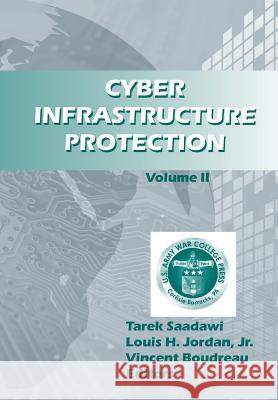Cyber Infrastructure Prevention Volume II » książka
Cyber Infrastructure Prevention Volume II
ISBN-13: 9781782663843 / Angielski / Miękka / 2013 / 278 str.
Increased reliance on the Internet and other networked systems raise the risks of cyber attacks that could harm our nation's cyber infrastructure. The cyber infrastructure encompasses a number of sectors including: the nation's mass transit and other transportation systems; banking and financial systems; factories; energy systems and the electric power grid; and telecommunications, which increasingly rely on a complex array of computer networks, including the public Internet. However, many of these systems and networks were not built and designed with security in mind. Therefore, our cyber infrastructure contains many holes, risks, and vulnerabilities that may enable an attacker to cause damage or disrupt cyber infrastructure operations. Threats to cyber infrastructure safety and security come from hackers, terrorists, criminal groups, and sophisticated organized crime groups; even nation-states and foreign intelligence services conduct cyber warfare. Cyber attackers can introduce new viruses, worms, and bots capable of defeating many of our efforts. Costs to the economy from these threats are huge and increasing. Government, business, and academia must therefore work together to understand the threat and develop various modes of fighting cyber attacks, and to establish and enhance a framework to assess the vulnerability of our cyber infrastructure and provide strategic policy directions for the protection of such an infrastructure. This book addresses such questions as: How serious is the cyber threat? What technical and policy-based approaches are best suited to securing telecommunications networks and information systems infrastructure security? What role will government and the private sector play in homeland defense against cyber attacks on critical civilian infrastructure, financial, and logistical systems? What legal impediments exist concerning efforts to defend the nation against cyber attacks, especially in preventive, preemptive, and retaliatory actions?
Increased reliance on the Internet and other networked systems raise the risks of cyber attacks that could harm our nations cyber infrastructure. The cyber infrastructure encompasses a number of sectors including: the nations mass transit and other transportation systems; banking and financial systems; factories; energy systems and the electric power grid; and telecommunications, which increasingly rely on a complex array of computer networks, including the public Internet. However, many of these systems and networks were not built and designed with security in mind. Therefore, our cyber infrastructure contains many holes, risks, and vulnerabilities that may enable an attacker to cause damage or disrupt cyber infrastructure operations. Threats to cyber infrastructure safety and security come from hackers, terrorists, criminal groups, and sophisticated organized crime groups; even nation-states and foreign intelligence services conduct cyber warfare. Cyber attackers can introduce new viruses, worms, and bots capable of defeating many of our efforts. Costs to the economy from these threats are huge and increasing. Government, business, and academia must therefore work together to understand the threat and develop various modes of fighting cyber attacks, and to establish and enhance a framework to assess the vulnerability of our cyber infrastructure and provide strategic policy directions for the protection of such an infrastructure. This book addresses such questions as: How serious is the cyber threat? What technical and policy-based approaches are best suited to securing telecommunications networks and information systems infrastructure security? What role will government and the private sector play in homeland defense against cyber attacks on critical civilian infrastructure, financial, and logistical systems? What legal impediments exist concerning efforts to defend the nation against cyber attacks, especially in preventive, preemptive, and retaliatory actions?











